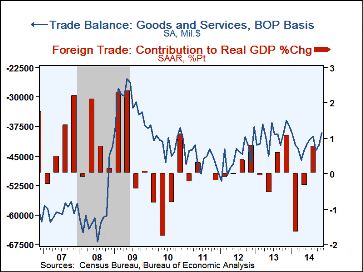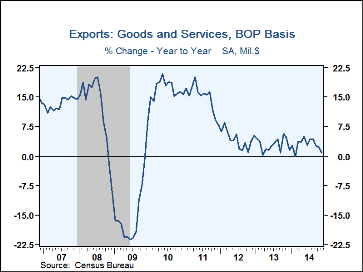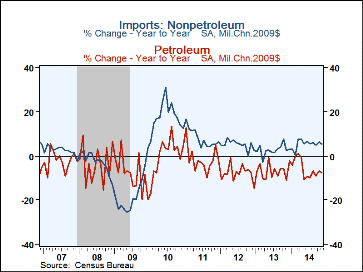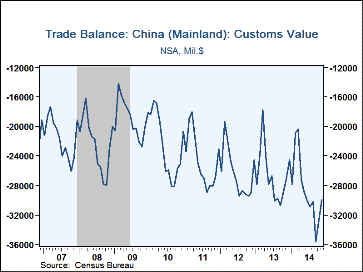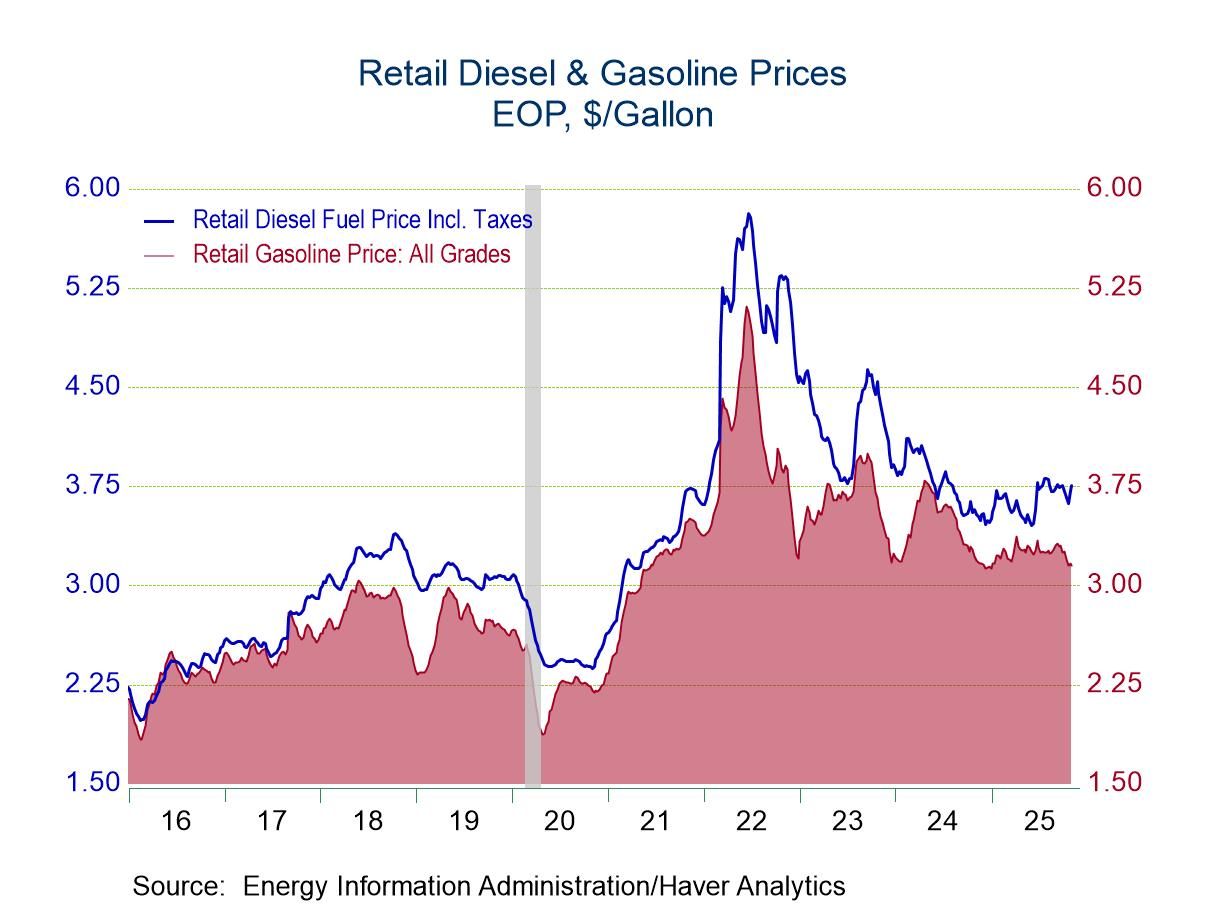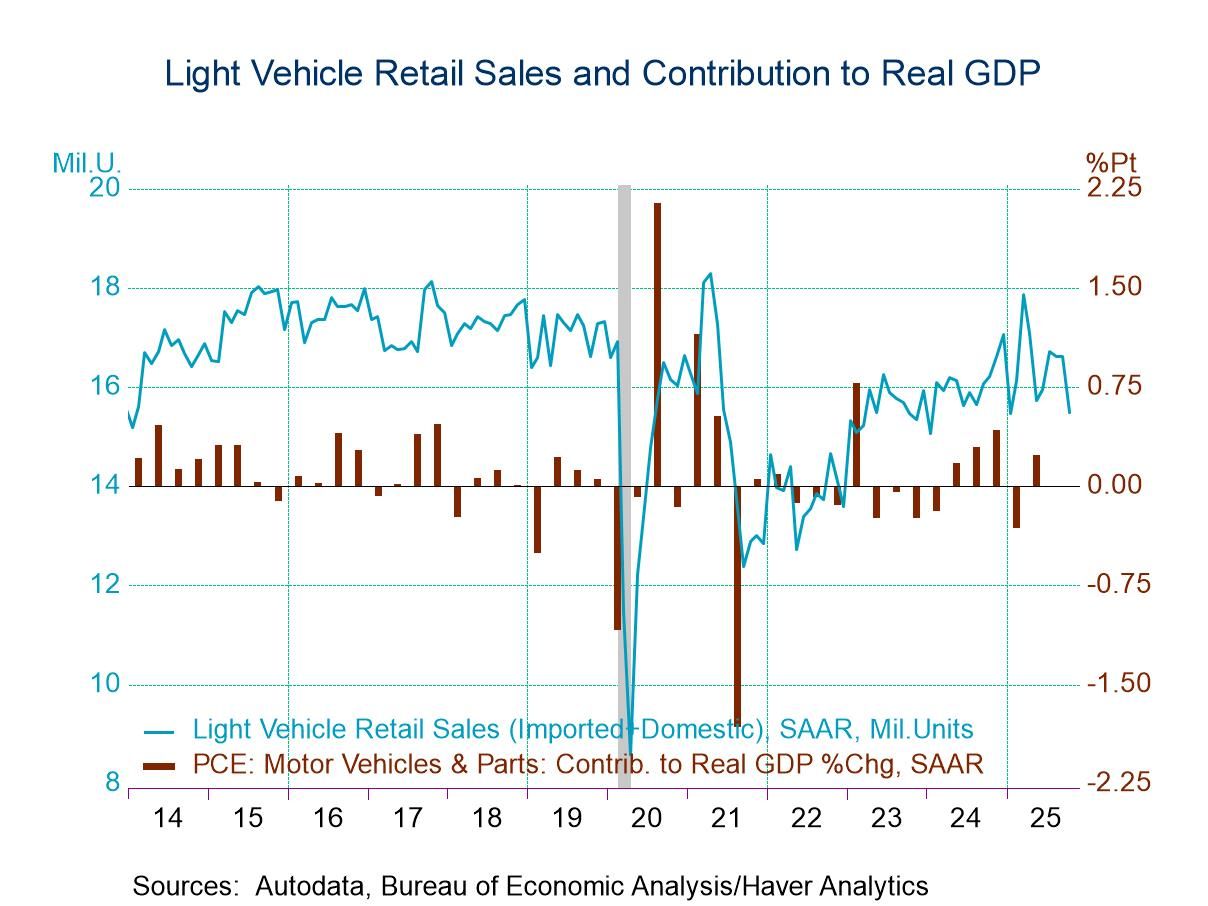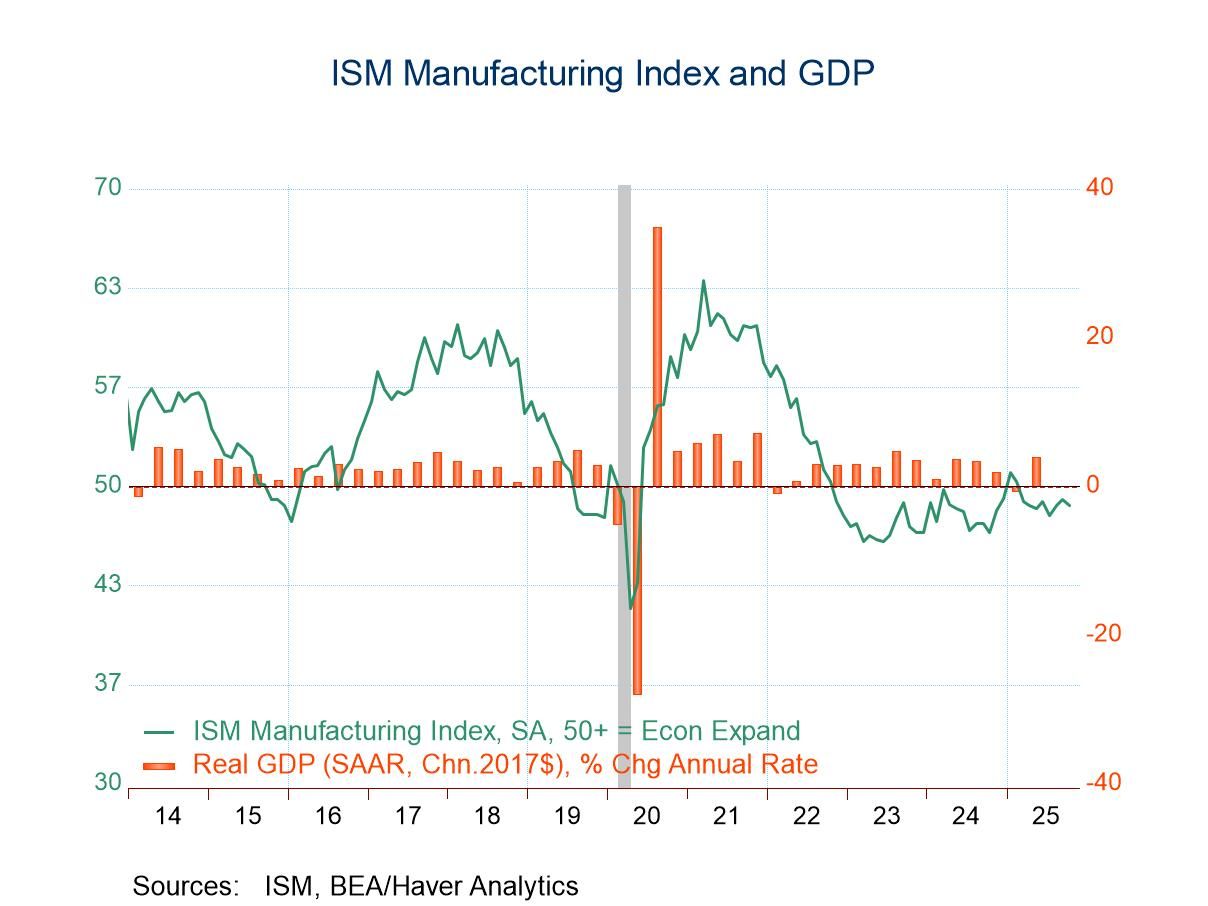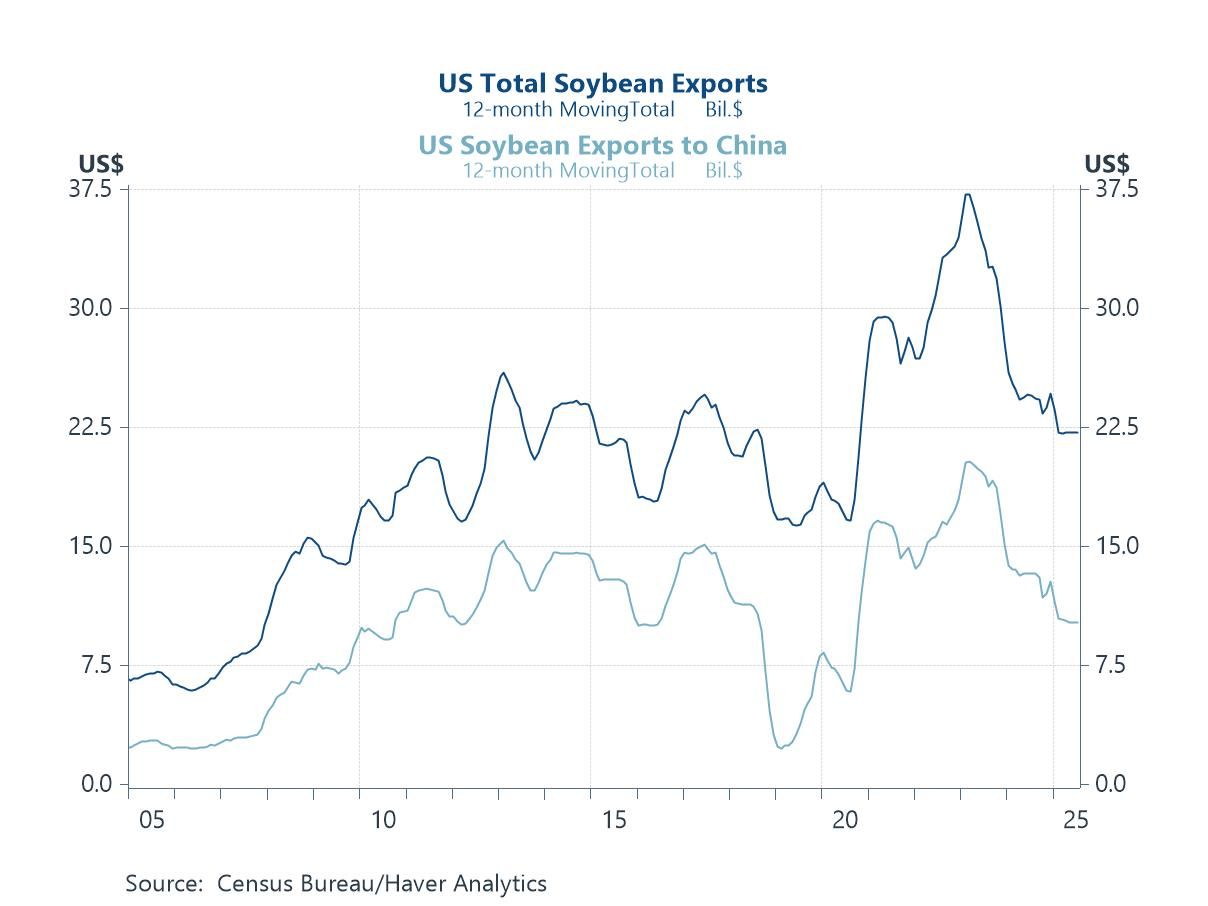 Global| Jan 07 2015
Global| Jan 07 2015U.S. Trade Deficit Narrows Sharply With Fewer Imports
by:Tom Moeller
|in:Economy in Brief
Summary
The U.S. foreign trade deficit in goods and services narrowed to $39.0 billion in November from $42.2 billion in October, revised from $43.4 billion. It was the smallest deficit since December 2013 and compared to $41.9 billion [...]
The U.S. foreign trade deficit in goods and services narrowed to $39.0 billion in November from $42.2 billion in October, revised from $43.4 billion. It was the smallest deficit since December 2013 and compared to $41.9 billion expected in the Action Economics Forecast Survey. Exports fell 1.0% (+0.7% y/y), after October's 1.6% increase. That shortfall was outpaced by a 2.2% drop (+1.9% y/y) in imports. Nonpetroleum imports fell 1.2% (+5.9% y/y) while petroleum imports were off 11.9% (-20.0% y/y). This decline reflected a drop in crude petroleum costs to $82.95 per barrel (-12.4% y/y) as well as a 15.7% fall in the quantity of crude oil imports (-11.2% y/y). In constant dollars, the merchandise trade deficit declined to $47.8 billion, its least since July. The real value of goods exports slipped 0.4% (+2.6% y/y) and the real value of merchandise imports declined 1.6% (+3.5% y/y).
The decline in real merchandise exports reflected a 4.7% drop in real capital goods exports (-0.2% y/y) as well as a 3.6% decline (+0.2% y/y) in price-adjusted auto exports. Real nonauto consumer goods exports fell 2.4% (+6.4% y/y) but constant dollar industrial supplies & materials exports jumped 4.8% (5.4% y/y). Services exports fell 0.2% (+2.5% y/y) as travel exports slipped 0.2% (+1.7% y/y). The 1.6% decline in real imports was powered by a 6.1% drop (-7.5% y/y) in constant dollar petroleum imports. Real imports of nonpetroleum products fell 0.9% (+5.4% y/y). Real industrial supplies & materials imports fell 5.0% (-1.7% y/y) while inflation-adjusted foods, feeds & beverage imports were off 4.5% (+3.2% y/y). Real auto imports declined 2.6% (+2.2% y/y) and constant dollar capital goods imports were off 1.4% (+6.0% y/y). Offsetting these declines was 3.4% rise (7.3% y/y) in real exports of nonauto consumer goods. Services imports notched 0.1% lower (+2.5% y/y) as travel imports fell 0.7% (+6.0% y/y).
By country, the deficit in goods with China eased to $29.9 billion, its least in six months. Imports from China were up 5.0% y/y but exports fell 6.7% y/y. The trade deficit with Japan also lessened to $5.5 billion. Exports to Japan declined 13.2% y/y while imports were off 8.7% y/y. The trade deficit with the European Union eased to $11.8 billion as exports declined 2.7% y/y but imports rose 2.6% y/y.
The international trade data can be found in Haver's USECON database. Detailed figures are available in the USINT database. The expectations figures are from the Action Economics Forecast Survey, which is carried in the AS1REPNA.
The minutes to the latest FOMC meeting can be found here.
| Foreign Trade (Current Dollars) | Nov | Oct | Sep | Y/Y | 2013 | 2012 | 2011 |
|---|---|---|---|---|---|---|---|
| U.S. Trade Deficit | $39.0 bil. | $42.2 bil. | $43.6 bil | $36.0 bil. (11/13) |
$476.4 bil. | $537.6 bil. | $548.6 bil. |
| Exports (%) | -1.0 | 1.6 | -1.8 | 0.7 | 2.9 | 4.2 | 14.8 |
| Imports | -2.2 | 0.7 | 0.0 | 1.9 | 0.1 | 2.9 | 13.9 |
| Petroleum | -11.9 | -0.7 | -3.3 | -20.0 | -11.0 | -5.5 | 30.7 |
| Nonpetroleum goods | -1.2 | 1.0 | 0.4 | 5.9 | 2.0 | 5.2 | 12.1 |
Tom Moeller
AuthorMore in Author Profile »Prior to joining Haver Analytics in 2000, Mr. Moeller worked as the Economist at Chancellor Capital Management from 1985 to 1999. There, he developed comprehensive economic forecasts and interpreted economic data for equity and fixed income portfolio managers. Also at Chancellor, Mr. Moeller worked as an equity analyst and was responsible for researching and rating companies in the economically sensitive automobile and housing industries for investment in Chancellor’s equity portfolio. Prior to joining Chancellor, Mr. Moeller was an Economist at Citibank from 1979 to 1984. He also analyzed pricing behavior in the metals industry for the Council on Wage and Price Stability in Washington, D.C. In 1999, Mr. Moeller received the award for most accurate forecast from the Forecasters' Club of New York. From 1990 to 1992 he was President of the New York Association for Business Economists. Mr. Moeller earned an M.B.A. in Finance from Fordham University, where he graduated in 1987. He holds a Bachelor of Arts in Economics from George Washington University.


